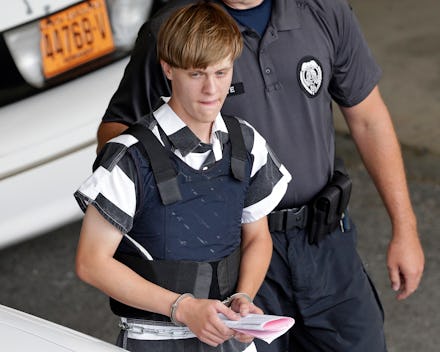Dylann Roof Sentencing: Day 2 prompts tears, objections over victims' family testimony

CHARLESTON, S.C. — Denise Quarles, the daughter of Charleston church shooting victim Myra Thompson, began the second day of Dylann Roof's death penalty sentencing trial on Thursday by recalling memories of her late mother.
They loved watching House Hunters while on the phone, and Thompson had a strict "no-speaking" policy until the commercials came on. Quarles said she was surprised by her mother's prowess in Wii Boxing. Thompson took great pride in teaching her daughter how to be a woman, Quarles said.
"I felt like I was Rudy from The Cosby Show, because mom was Claire [Huxtable] to me," Quarles told jurors.
But it was when Quarles addressed the way her mother died — while leading a bible study at Emanuel African Methodist Episcopal Church on June 17, 2015 — that her testimony drew tears and, eventually, objections about the length of testimony from Roof, who is acting as his own lawyer.
"For her to die, welcoming in a stranger to a church where she grew up, where I got baptized, where she got married," Quarles said, trailing off through tears. "I won't let what happened stop me from going there."
Roof objected to Quarles' veering from the victim impact statement — a kind of testimony reserved for family members to talk solely about their loved one. He also submitted a motion, prompting U.S. District Judge Richard Gergel to instruct the jury to disregard any portion of victim impact statements that isn't about the character of the nine people Roof gunned down.
"It is not fair to allow that much testimony to be heard by the jury when I am not presenting any evidence — from my family or anyone else — in mitigation," Roof stated in the motion. "Victim impact testimony should be limited to a 'quick glimpse' of the victims' lives."
Gergel also entertained a discussion between U.S. Attorney Jay Richardson and Roof's standby defense counsel, David Bruck, during which Bruck addressed the length of the victim impact testimony.
"This is his sentencing, it is not a memorial service," Bruck said to Gergel, who had already warned Richardson's team about the excessiveness of a list of over 30 planned witnesses.
"We have to do something to stop this from continuing," Bruck added, requesting the permission to object to witness testimony on Roof's behalf.
"He is the one that chose to go into a church and kill nine people, particularly good people!" Richardson retorted, noting that Roof had been given ample opportunity to change his mind about representing himself for the penalty phase.
Gergel denied Bruck's request, but told Roof he should continue to object when he felt compelled.
"Our guiding light must be a fair process," Gergel said.
If Roof wanted a break in heart-wrenching testimonies from his victims' families, he got it toward the end of Thursday's proceedings. Federal prosecutors called to the stand a Charleston County jail official who read Roof's words from previously unseen jailhouse journal.
"I would like to make crystal clear, I do not regret what I did," Lauren Knapp, the jail official, read from the journal in open court. "I am not sorry. I have not shed a tear for the innocent people I killed."
Emotional victim impact testimony resumed with the daughter, college friend and sister of victim Sharonda Coleman-Singleton, as well as the son and close friend of Rev. Daniel Simmons Sr.
Two daughters and a sister of victim DePayne Middleton-Doctor also testified. Bethane Middleton-Brown, DePayne's sister, broke down upon recalling that the last time she spoke on the phone to her sister was the day Middleton-Doctor was killed.
Middleton-Brown had missed three calls from her sister, but was reached on a fourth attempt, during which DePayne told her she'd only called to say "I love you."
"If I hadn't have taken that call, I would have missed my love," Middleton-Brown said through sobs.
The same jury weighing whether to put Roof to death or imprison him for life found him guilty Dec. 15 on 33 charges that he entered Emanuel AME and opened fire on attendees because of their race.
On Wednesday, jurors heard from Jennifer Pinckney, the widow of Clementa Pinckney, who was the pastor of Emanuel AME. She was followed by Pinckney's childhood friend, Kylon Middleton, and his South Carolina state Senate colleague Gerald Malloy. Anthony Thompson, husband of Myra Thompson, also testified.
Jan. 6, 2017, 4:21 a.m. Eastern: This story has been updated.